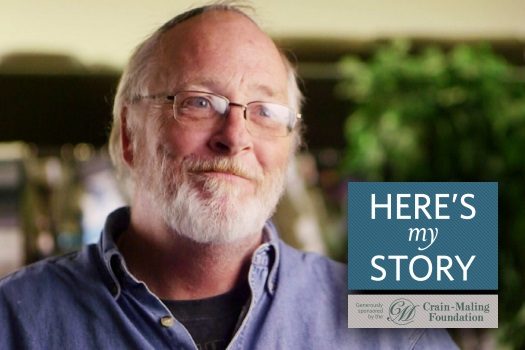
Here’s My Story: The Pharmacist’s Son
Mr. Harvey Milstein presently lives in Israel, where he was interviewed by JEM’s My Encounter with the Rebbe project in February of 2015.
Click here for a PDF version of this edition of Here’s My Story, or visit the My Encounter Blog.
I grew up in Crown Heights where my father, Morris Milstein, operated a well-known drugstore – Milstein’s Pharmacy – at the corner of Troy and Lefferts.
Although my father attended the morning prayers every day, he was not a religious man – that is, he did not wear a yarmulke, and his pharmacy was opened seven days a week.
Back then, in the late 1950s and early 1960s, pharmacies were not what they are today. The medicines did not come packaged in bottles ready to be taken – they had to be prepared with a mortar and pestle, and I remember my father physically grinding chemicals to make tablets and capsules.
My father basically functioned as a doctor with people coming to him for medical advice, and he practically lived in that drugstore, where my mother also worked.
Even though we were not Lubavitchers, over time, my father developed a strong friendship with the Rebbe, and my mother with the Rebbe’s wife. The Rebbetzin would frequently come to the store to pick up medicines – not necessarily for herself or the Rebbe, but for others. And she and my mother would go grocery shopping in the Rebbetzin’s car, often taking me along.
My father enjoyed long discussions with the Rebbe. Sometimes my father would bring me with him but being a young boy, I was not interested in their conversations – which were usually about philosophy and business. So I would go outside to play stoopball. But after I broke a window I was not allowed to come anymore.
During that time, the Rebbe tried hard to get my father to close the store on Shabbos. My father argued that people depended on him and that by making medicines he was saving lives. But the Rebbe said, “You can close on Shabbos. These are not life-or-death cases that can’t be postponed until Sunday. It’s important for you to close for your Jewish essence and your spiritual wellbeing.”
Of course, Saturday was also the busiest day of the week for a pharmacist. People were off from work and they came to the store and bought things. So my father wouldn’t close, and the Rebbe continued to argue with him about it.
Then an Italian opened a pharmacy a block away at Albany and Lefferts. When that happened the Rebbe told my father that now he had no excuse because the other pharmacy was opened 24 hours – there was somebody on duty who would save lives if lives needed saving.
“But what about my livelihood?” my father demanded. “Saturday is when I make my money for the week.”
The Rebbe responded with a letter in which he wrote as follows:
“As for the question of parnasso and the immediate effect it may have on the revenue from the store, when the store is closed on Shabbos and Yom Tov, the important thing … is not the amount of money earned, as how it is going to be used. For any logical person would prefer to earn less but use the earnings on healthy and happy things, rather than earn more and spend it, G-d forbid, on doctor’s bills and the like, when not only is there an expense but also the trouble and pain involved, G-d forbid. In the final analysis, one should bear in my mind that money earned in a way that is contrary to Divine Law cannot serve a useful purpose and the apparent gain can only be illusory, and even worse. Thus, from whatever point of view you look at it, religious, moral or economic, there is no justification for keeping your store open on Shabbos and Yom Tov, nor can it serve your best interests. On the other hand, abiding by Divine Law will bring you additional Divine blessings for good health and prosperity, both materially and spiritually.”
The Rebbe closed the letter with blessings for the upcoming Passover holiday and with these words: “May the season of our liberation bring you and yours a full measure of liberation from all doubts and anxieties, and true freedom in the fullest sense of the term…”
And that finally convinced my father to close the store.
As for me, I began to gravitate to Chabad at an early age. At the time that I was a teenager, many Jews began moving away from Crown Heights and my father’s synagogue, Yeshivah Reiness, had dwindled from five hundred members to only thirty. But Chabad was thriving. I started going there on Shabbos mornings when the place would be packed with a thousand or maybe even two thousand people. It would be a sea of people – with everyone wearing a black hat and black jacket – and I would stick out like a sore thumb with my bright red sweaters or checkered green jackets. And I distinctly recall the Rebbe looking at me and acknowledging me.
In those days, the Rebbe and the Rebbetzin were accessible and approachable. I remember the warmth that they both radiated which made even a child like me feel comfortable.
And I find that their warmth lives on in the Chabad communities the world over. When I made aliyah to Israel, I ended up living in Takoah where I joined the Chabad community because they made me feel so welcome.
I think Chabad is the core of what Judaism should be. To me, this is demonstrated by the fact that you can walk into a place like Chabad of Takoah and feel comfortable no matter how you’re dressed. Everyone who comes is always greeted with warmth – the warmth that I remember as the Rebbe’s trademark.















